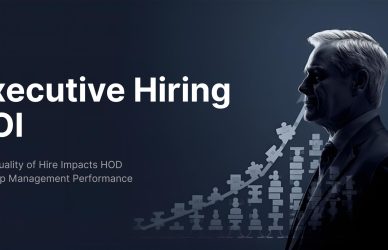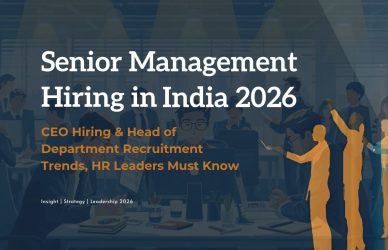Introduction: Rethinking HR in the Executive Era
The New Age of Executive Services
In today’s dynamic business landscape, organizations face a paradigm shift in how they manage talent, leadership, and strategy. At the forefront of this transformation is the rise of executive services, a specialized segment of HR focused on attracting, developing, and retaining top-tier leadership talent. These services are evolving beyond the basics of executive search to include holistic leadership solutions that align with broader business objectives.
Modern businesses encounter unprecedented challenges—ranging from rapid technological advancement and remote work to global market shifts and an ever-growing focus on ESG (Environmental, Social, and Governance). Navigating these complexities requires top-tier executives who are not only visionary but adaptable. This is where executive services step in, transforming HR from a support function to a strategic enabler of leadership success.
Defining Executive Services
Executive services encompass a suite of HR capabilities tailored specifically for senior leadership roles. These include high-level recruitment, succession planning, leadership coaching, compensation strategy, performance analytics, and board governance advisory. Unlike general HR operations, these services are strategic in nature, focusing on shaping the leadership DNA of the organization.
The evolution of executive services also reflects the rising importance of data-driven decision-making. From using predictive analytics in identifying leadership potential to integrating DEI strategies at the board level, executive services bring structure, insight, and foresight to leadership planning.
Why Executive Services Are the Future of HR
The modern organization cannot afford leadership gaps or poor executive fit. The cost of a failed executive hire is measured not only in financial terms but also in cultural disruption and strategic setbacks. Executive services help mitigate these risks by aligning leadership strategy with business objectives.
Moreover, the shift towards agile, hybrid, and global workplaces demands leaders with a unique mix of competencies. Executive services play a critical role in identifying and nurturing such talent. Their future-forward approach ensures that organizations have the leadership bench strength to drive growth, weather disruptions, and foster innovation.
In summary, as the HR function transforms into a strategic powerhouse, executive services emerge as a cornerstone. They represent a proactive, intelligent, and high-impact approach to leadership management—one that will undoubtedly shape the future of HR.

The Evolution of Executive Services in HR
From Traditional Recruitment to Strategic Leadership
The journey of executive services in HR has undergone a remarkable transformation. In the past, organizations relied primarily on recruitment firms to headhunt senior executives, with little emphasis on cultural fit or long-term strategic alignment. These services were often reactive, triggered by an immediate leadership vacancy.
Today, executive services have become proactive and integrated with business strategy. Organizations no longer view executive recruitment as a one-off event but as part of a broader leadership lifecycle management approach. This includes anticipating future leadership needs, preparing internal candidates, and creating contingency plans for sudden departures.
Milestones in Executive HR Development
Several pivotal shifts have shaped the evolution of executive services:
- 1990s–2000s: Emergence of retained search firms focused on C-suite placements.
- 2000s–2010s: Introduction of executive assessments and leadership development as add-on services.
- 2010s–2020s: Use of AI and big data in talent mapping, predictive performance analytics, and culture fit evaluation.
- 2020s onward: Strategic integration of DEI, ESG, and global mobility into executive hiring frameworks.
Influence of Technology and Globalization
The integration of technology has revolutionized executive services. AI-driven tools now scan thousands of data points to match executives with roles that fit their values, leadership style, and potential for impact. Behavioral science and predictive analytics help forecast executive success and organizational compatibility.
Globalization, meanwhile, has broadened the executive talent pool. Organizations increasingly need leaders with cross-cultural fluency, multilingual communication skills, and international market experience. Executive services today span continents, facilitating global leadership sourcing and compliance with local employment norms.
Another key influence is the rise of ESG standards. Boards are under increasing pressure to ensure that executive leadership aligns with sustainable and ethical practices. As such, modern executive services incorporate ESG assessments and leadership training as part of their standard offering.
In short, the evolution of executive services reflects the growing complexity of leadership and the need for a structured, data-informed, and culturally aware approach to managing executive talent.
Key Components of Modern Executive Services
Executive Search and Talent Mapping
Modern executive search extends far beyond traditional headhunting. It involves proactive talent mapping, succession bench strength evaluation, and market intelligence gathering. Advanced tools analyze potential candidates across sectors, evaluate public profiles, and leverage social signals to determine cultural alignment and leadership fit.
Top firms use proprietary algorithms to assess a candidate’s likelihood to succeed in a given role. Metrics like adaptability score, innovation index, and team influence quotient are emerging benchmarks. Executive search firms often build long-term relationships with top talent, maintaining a “warm pipeline” of qualified leaders.
Leadership Assessment and Development
Once potential leaders are identified, robust assessment tools come into play. Psychometric tests evaluate cognitive style, emotional intelligence, and risk tolerance. In-person simulations and executive role-play exercises are used to assess decision-making, team engagement, and crisis management skills.
Following assessment, executive development plans are crafted. These include one-on-one coaching, leadership immersion programs, stretch assignments, and 360-degree feedback loops. The goal is not just to hire great leaders, but to continuously evolve them.
Succession Planning
Succession planning is critical to organizational continuity. Modern succession tools enable scenario planning, performance potential matrices, and predictive attrition analytics. Executive services create tailored pipelines for key roles, identifying successors 1 to 3 levels below.
They also incorporate diversity considerations, ensuring underrepresented groups have equitable access to leadership tracks. Succession readiness metrics and transition planning workshops are part of a mature executive HR strategy.
Compensation Benchmarking and Negotiation
Executive compensation is complex and multidimensional. Executive HR teams use market data to create customized packages that align with role criticality, industry standards, and shareholder expectations. Compensation includes fixed salary, performance bonuses, stock options, LTIPs (long-term incentive plans), and golden parachutes.
Negotiations also involve aligning compensation with long-term goals such as ESG performance, innovation milestones, or market expansion KPIs. Compensation transparency and governance frameworks ensure equity and regulatory compliance.
Onboarding and Integration Support
C-level onboarding is strategic. Executive HR plans include cultural onboarding, stakeholder mapping, and early win strategies. Executives undergo strategic alignment meetings, shadow key leaders, and get paired with mentors.
Integration is measured over a 90 to 180-day period, with pulse surveys and stakeholder feedback mechanisms in place. The focus is not just knowledge transfer but cultural assimilation, trust-building, and role clarity.
Board Advisory and Governance Services
Executive HR teams work with boards to evaluate CEO performance, manage leadership transitions, and improve board diversity. They offer advisory on governance structure, crisis communication, and stakeholder management.
This component also includes board succession planning, skill gap assessments, and training for new directors. The emphasis is on creating cohesive leadership at both executive and board levels.

The Strategic Role of Executive Services in Future HR Models
Executive HR as Strategic Business Partner
Executive services are redefining how HR contributes to business success. No longer relegated to administrative functions, HR is now expected to act as a strategic business partner. Executive services play a pivotal role by connecting leadership strategy with business goals, ensuring that talent at the top directly contributes to organizational success.
These services enable HR leaders to sit at the decision-making table, influencing M&A strategies, digital transformation initiatives, and global expansion planning. By providing insights into leadership readiness, succession planning, and executive development, HR becomes an indispensable strategic advisor.
Agile and Proactive Leadership Management
In the face of rapid market fluctuations, organizations need leaders who can anticipate and adapt to change. Executive services focus on developing agility within the leadership pipeline. This includes identifying change-ready leaders, deploying interim executives during transitions, and implementing real-time leadership analytics to spot gaps early.
Proactive executive HR strategies involve scenario planning, talent forecasting, and risk assessments. For example, if a sudden leadership exit occurs, executive HR must have immediate successors identified and briefed. Such planning reduces disruption and maintains business continuity.
Driving Innovation Through Leadership
Innovative leadership is the engine of organizational growth. Executive services prioritize identifying leaders who can challenge the status quo, embrace experimentation, and build cultures of innovation. This includes evaluating innovation competencies during executive assessments and aligning leadership KPIs with innovation outputs.
Innovation-focused leadership hiring is especially critical for industries undergoing digital transformation. Executive HR teams use innovation profiling tools to assess a candidate’s ability to inspire creativity, drive collaboration, and implement new business models.
Embedding Diversity, Equity, and Inclusion (DEI) at the Top
DEI is a strategic priority in modern organizations, and executive services are central to embedding it into the C-suite. Executive HR services ensure that DEI principles are not just values but selection criteria during hiring.
Metrics such as representation ratios, inclusive leadership indices, and DEI-based succession planning are integrated into executive performance reviews. Additionally, executive development programs are being designed to foster inclusive decision-making, unconscious bias awareness, and equitable career advancement.
Global Talent Mobility and Remote Leadership
The global shift toward hybrid and remote work has reshaped leadership requirements. Executive services must now focus on sourcing and supporting leaders who can manage decentralized teams, work across time zones, and build culture remotely.
This includes building global talent mobility programs that simplify international transfers, managing virtual onboarding for executives, and ensuring compliance with international employment regulations. Cultural intelligence training is also becoming a staple for globally mobile executives.
In essence, the strategic role of executive services is multifaceted: driving business value through leadership, enabling agility in decision-making, and aligning top talent with long-term strategy.
Challenges and Considerations for Executive HR Services
Leadership Talent Scarcity
One of the most pressing challenges in executive HR is the scarcity of qualified leadership talent. As industries converge and roles become increasingly complex, the criteria for leadership success have become more demanding. Identifying leaders with the right blend of innovation, emotional intelligence, global perspective, and execution capability is no easy task.
The scarcity is further intensified by demographic trends such as the retirement of baby boomers and the increasing desire for flexible, non-traditional career paths among younger leaders. Executive services must develop creative strategies to nurture, attract, and retain talent from a smaller pool.
Ethical and Confidentiality Concerns
The executive search process involves highly sensitive information. Breaches in confidentiality during executive hiring can lead to legal disputes, reputational damage, and broken deals. Ethical concerns also arise when recruiting from competitors or evaluating internal candidates without transparency.
To address these challenges, executive HR professionals must follow strict compliance protocols, implement non-disclosure agreements, and maintain objectivity in candidate evaluations. Firms often use third-party consultants to ensure impartiality in high-stakes scenarios.
Balancing Internal Promotions vs. External Hires
Striking the right balance between promoting internal talent and bringing in external candidates is a strategic dilemma. Promoting from within ensures cultural continuity and motivates high performers. However, external hires often bring new ideas, market insights, and transformation capabilities.
Executive services must use performance analytics, leadership potential assessments, and stakeholder feedback to make informed decisions. A transparent leadership mobility policy helps align expectations and reduce internal resistance.
Integration of Technology
Technology is a double-edged sword in executive HR. While it enables faster, data-driven decisions, over-reliance can result in biased or impersonal outcomes. AI algorithms may unintentionally favor certain demographics or undervalue qualitative leadership traits.
To mitigate these risks, executive HR must use technology ethically and combine it with human expertise. Continuous monitoring and auditing of technology platforms are essential to maintain fairness and accuracy.
Managing Cultural Fit
Cultural alignment is a critical success factor in executive placements. Even the most skilled executive can fail if they don’t align with the organization’s values, communication style, or pace of operations.
Executive HR must assess cultural fit using qualitative interviews, team compatibility simulations, and behavioral assessments. Post-placement support, including culture assimilation coaching and stakeholder feedback loops, ensures smoother integration.
By navigating these challenges with care and foresight, executive services can deliver long-term value and leadership stability.

Future Trends Shaping Executive Services
AI-Powered Executive Search
Artificial Intelligence is set to revolutionize how executive talent is sourced and matched. Algorithms can analyze resumes, digital footprints, leadership styles, and social media activity to create predictive performance profiles. These AI systems assess not only hard skills but also soft traits like empathy, adaptability, and collaboration, enabling a data-driven approach to candidate shortlisting.
As these tools evolve, they’ll integrate seamlessly with applicant tracking systems, talent intelligence platforms, and even organizational performance dashboards. This will allow executive HR teams to make faster, smarter, and more accurate hiring decisions while minimizing unconscious bias.
Virtual Executive Coaching and Development
The hybrid and remote work era has pushed leadership development online. Virtual executive coaching platforms now use video AI analytics to assess facial expressions, speech patterns, and engagement levels. These tools deliver personalized feedback, simulate decision-making scenarios, and provide access to global coaching talent.
Digital leadership academies offer microlearning, gamified modules, and peer coaching environments. These scalable platforms ensure ongoing development for executives without needing to take them out of their business contexts. Executive services will increasingly invest in such platforms to ensure continuous leadership readiness.
ESG Leadership Integration
Environmental, Social, and Governance (ESG) values are becoming essential indicators of leadership quality. Investors, employees, and customers demand that companies be led by individuals who prioritize sustainability, social responsibility, and ethical governance.
Future executive services will evaluate ESG alignment during candidate assessments. New metrics will track a leader’s past involvement in green initiatives, community programs, and board-level governance. ESG dashboards and scorecards will be used to track executive accountability post-hire.
Dynamic Succession Modeling
Gone are the days of static succession charts. Today’s business uncertainty demands dynamic succession modeling that adapts to real-time changes in performance, strategy, and market conditions. AI and data analytics will power talent mobility maps, scenario simulations, and bench strength visualizations.
This trend will help organizations proactively fill leadership gaps, reduce dependency on a few top performers, and align leadership pipelines with changing business models. Executive HR platforms will offer live dashboards showing readiness scores and promotion probabilities for future leaders.
Rise of Freelance Executives and Interim Leadership
The gig economy is extending into the executive world. More organizations are turning to interim CEOs, project-based CFOs, and transformation-focused CMOs for high-impact short-term assignments. This model offers flexibility, cost savings, and access to niche expertise.
Executive HR services will create talent marketplaces specifically for freelance and interim leaders. These platforms will offer background checks, performance reviews, and reputation scoring for executive-level freelancers. This trend also requires a shift in onboarding, compensation, and compliance processes to manage on-demand leadership talent.
These future trends are not optional innovations—they are essential transformations that will define the next decade of executive services and the broader HR function.
Case Studies: How Executive Services Are Revolutionizing HR
Case Study 1: Tech Giant Revamps Leadership Pipeline
A global tech conglomerate was experiencing high attrition in senior leadership and low succession readiness. They partnered with an executive HR firm that implemented a full leadership assessment program using AI-powered predictive analytics and 360-degree feedback tools.
The result was a realigned succession plan identifying 3x more high-potential leaders within the organization. Internal promotions increased by 45%, and time-to-hire for C-suite positions dropped by 38%. Additionally, executive engagement scores rose due to targeted coaching and development plans.
Case Study 2: Manufacturing Leader Goes Global
A legacy manufacturing company wanted to enter Southeast Asia and South America but lacked international leadership expertise. They engaged an executive search firm that specialized in global talent mobility.
The firm conducted a global talent mapping exercise, leveraging local consultants to identify regionally relevant leadership talent. Within six months, the company hired a culturally diverse executive team. Revenue from international markets increased by 25% in one year, and market entry time was cut in half.
Case Study 3: DEI-Driven Executive Hiring
A Fortune 500 retail chain faced shareholder pressure to diversify its board. The executive HR team collaborated with a leadership advisory group to redefine their executive competency framework to include inclusive leadership.
New hiring guidelines prioritized empathy, cultural awareness, and equitable decision-making. Within one year, the company’s executive board composition included 45% women and 35% ethnic minorities. Employee trust and customer brand perception also improved significantly, as reflected in employee surveys and NPS scores.
These real-world examples demonstrate the strategic impact of executive services. From transforming succession planning to supporting global expansion and driving inclusive leadership, executive HR is enabling organizations to thrive amid disruption.
Conclusion: Executive Services Redefining the HR Horizon
Executive HR Is the Strategic Future
The future of HR lies not in process management but in leadership enablement. Executive services embody this shift, offering organizations the ability to align their leadership strategy with their long-term vision. As companies face a rapidly evolving business environment, executive HR provides the foresight and infrastructure needed to maintain a competitive edge.
Executive services transform HR from a back-office function to a strategic powerhouse. Whether it’s planning leadership succession, embedding ESG values in executive roles, or preparing leaders for digital transformation, these services ensure that leadership remains a sustainable advantage.
Investing in Leadership Yields Long-Term ROI
Leadership quality directly influences organizational performance, innovation capacity, employee engagement, and brand reputation. Executive services help optimize this quality by identifying, nurturing, and retaining the right leaders. Organizations that invest in executive HR report higher resilience, faster adaptation, and better stakeholder trust.
The return on investment (ROI) from executive services is tangible: reduced time-to-hire, lower leadership attrition, enhanced succession readiness, and increased shareholder confidence. These metrics position executive services not as a cost center but as a strategic enabler.
Preparing for the Next Decade
In the next ten years, executive HR will integrate even more deeply with technology, analytics, and strategic planning. Companies must prepare by modernizing their executive HR infrastructure, training internal HR leaders in data literacy and leadership science, and creating a culture that values leadership development.
To remain relevant, HR leaders must continuously evolve executive services to reflect market changes, workforce expectations, and global realities. The organizations that do so will not only survive disruption but lead the transformation.
In conclusion, executive services are the future of HR. They represent the convergence of leadership science, strategic talent management, and business foresight. As the business world grows more complex, the value of visionary, data-driven, and inclusive executive HR will only continue to rise.








